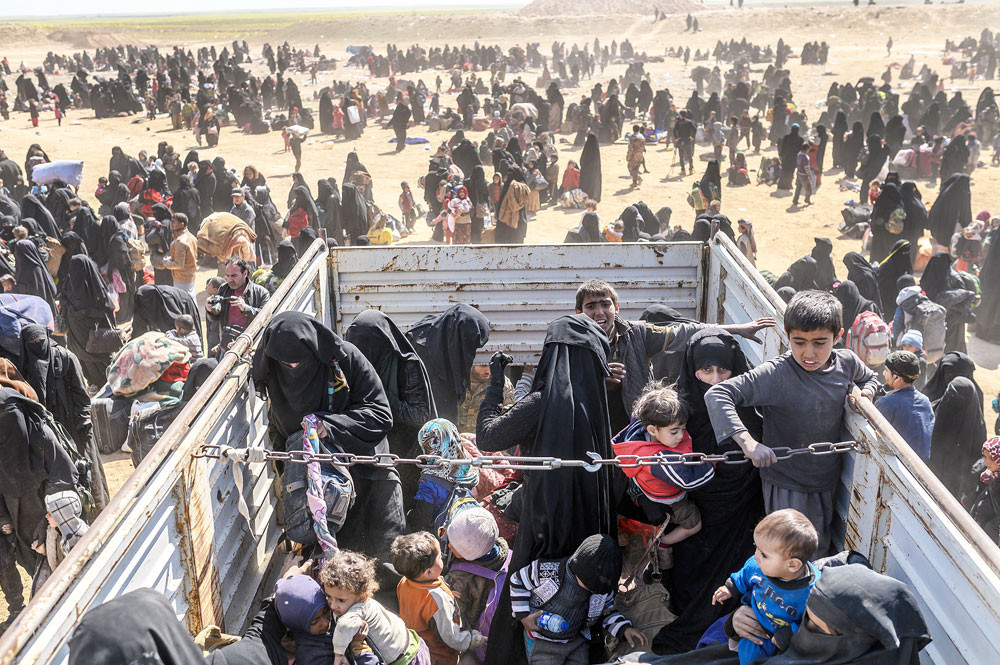Popular Reads
Top Results
Can't find what you're looking for?
View all search resultsPopular Reads
Top Results
Can't find what you're looking for?
View all search resultsWho is the Islamic State group's new boss?
Change text size
Gift Premium Articles
to Anyone
 Civilians evacuated from the Islamic State group’s embattled holdout of Baghouz wait at a screening area run by the Kurdish-led Syrian Democratic Forces (SDF), in the eastern Syrian province of Deir Ezzor on Wednesday. More than 7,000 people, mostly women and children, have fled the shrinking pocket over the past two days, as United States-backed forces press ahead with an offensive to crush holdout jihadists. (AFP/Bulent Kilic)
Civilians evacuated from the Islamic State group’s embattled holdout of Baghouz wait at a screening area run by the Kurdish-led Syrian Democratic Forces (SDF), in the eastern Syrian province of Deir Ezzor on Wednesday. More than 7,000 people, mostly women and children, have fled the shrinking pocket over the past two days, as United States-backed forces press ahead with an offensive to crush holdout jihadists. (AFP/Bulent Kilic)
J
ust days after Abu Bakr al-Baghdadi was killed in a raid by United States special forces in October, the Islamic State group announced the name of the man who has replaced him as leader.
But the true identity of Abu Ibrahim al-Hashimi al-Quraishi remains shrouded in mystery, and with it the organization's strategy going forward.
"We don't know much about him except that he is the leading judge of IS and he heads the Sharia [Islamic law] committee," said Hisham al-Hashemi, an Iraqi expert on the jihadist group.
But there are even doubts that the man designated "caliph", or religious ruler, exists at all.
Some suggest the group was caught off guard and announced a name as a holding move, to create the impression it is on top of things.
"The organization was taken by surprise by the brutality of Baghdadi's elimination," said Jean-Piere Filiu, an Arab world specialist at Paris' Sciences-Po university.
"It has since communicated the identity of a successor who we don't know if he truly exists or whether it is a decoy while the process of designating a true successor plays out in Syria and Iraq," he said.
Shortly after Baghdadi triggered a suicide belt during the American raid, US President Donald Trump announced to the world he had died "like a dog".
Trump claimed that he knew "exactly" who the successor was, but a senior American official soon after said the new leader was a "complete unknown".
Since then, radio silence.
"My understanding is the US knows who this is. In this world, you cannot keep secret who your leader is, no terrorist group today or yesterday can keep a secret as to how its leadership structure is. No one is that good," said Seth Jones of the Center for Strategic and International Studies in Washington.
Whether he exists or not, the heir has not provided visible leadership.
Under Baghdadi, who also avoided the limelight, the IS group experimented with running a proto-state – producing school textbooks and creating its own currency.
Since the jihadist organization was driven out of its last patch of Syrian territory, the village of Baghouz, in March, it has resorted mainly to guerilla tactics.
If Quraishi is to avoid an internal leadership challenge, he will be forced to step out of the shadows, the experts say.
"There's going to be a tension between his need to assert himself and be effective, and his desire for security," said Daniel Byman, a researcher at the University of Georgetown in Washington.
Opting for the latter could be costly, creating a void for jihadist groups to vie for supremacy.
"We already see significant criticisms from other jihadists, who are saying that you can't really be a caliph if you don't have a caliphate," said Byman. "This person will have a very hard time establishing leadership."
For Filiu, vicious attacks carried out by IS affiliates in the Sinai and Greater Sahara regions of Africa are helping to give the central leadership time to reorganize.
Robin Simcox, a researcher at the American Heritage Foundation, says a weakened IS has little hope of reconquering territory in the near future, meaning its fighters will go to ground and adopt "insurgency" tactics.
"While that makes it a trickier adversary to track down in some ways, it also makes it harder for them to attract recruits in the same numbers as there is no longer a Caliphate for foreigners to travel to," he said.
"It also makes it harder to raise funds, as ISIS previously brought in significant revenues through taxation and extortion of those who lived under its control in the Caliphate."
The group's new head, added Jones, "badly needs an attack" of the style seen in Europe in recent years – an operation "where the Islamic State is involved in organizing, funding, planning, orchestrating" – as a show of strength.
"I will strongly suspect they would like a new wave to be underway," he said.
For Byman, this is "a turning point for the group.
"But without knowing much about the leader, it's very hard to know which way they'll turn."









